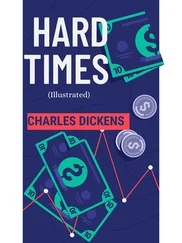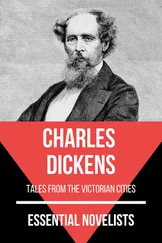“Mrs. Bounderby,” he returned, laughing, “upon my honour, no. I will make no such pretence to you. I have seen a little, here and there, up and down; I have found it all to be very worthless, as everybody has, and as some confess they have, and some do not; and I am going in for your respected father's opinions—really because I have no choice of opinions, and may as well back them as anything else.”
“Have you none of your own?” asked Louisa.
“I have not so much as the slightest predilection left. I assure you I attach not the least importance to any opinions. The result of the varieties of boredom I have undergone, is a conviction (unless conviction is too industrious a word for the lazy sentiment I entertain on the subject), that any set of ideas will do just as much good as any other set, and just as much harm as any other set. There's an English family with a charming Italian motto. What will be, will be. It's the only truth going!”
This vicious assumption of honesty in dishonesty—a vice so dangerous, so deadly, and so common—seemed, he observed, a little to impress her in his favour. He followed up the advantage, by saying in his pleasantest manner: a manner to which she might attach as much or as little meaning as she pleased: “The side that can prove anything in a line of units, tens, hundreds, and thousands, Mrs. Bounderby, seems to me to afford the most fun, and to give a man the best chance. I am quite as much attached to it as if I believed it. I am quite ready to go in for it, to the same extent as if I believed it. And what more could I possibly do, if I did believe it!”
“You are a singular politician,” said Louisa.
“Pardon me; I have not even that merit. We are the largest party in the state, I assure you, Mrs. Bounderby, if we all fell out of our adopted ranks and were reviewed together.”
Mr. Bounderby, who had been in danger of bursting in silence, interposed here with a project for postponing the family dinner till half-past six, and taking Mr. James Harthouse in the meantime on a round of visits to the voting and interesting notabilities of Coketown and its vicinity. The round of visits was made; and Mr. James Harthouse, with a discreet use of his blue coaching, came off triumphantly, though with a considerable accession of boredom.
In the evening, he found the dinner-table laid for four, but they sat down only three. It was an appropriate occasion for Mr. Bounderby to discuss the flavour of the hap'orth of stewed eels he had purchased in the streets at eight years old; and also of the inferior water, specially used for laying the dust, with which he had washed down that repast. He likewise entertained his guest over the soup and fish, with the calculation that he (Bounderby) had eaten in his youth at least three horses under the guise of polonies and saveloys. These recitals, Jem, in a languid manner, received with “charming!” every now and then; and they probably would have decided him to “go in” for Jerusalem again to-morrow morning, had he been less curious respecting Louisa.
“Is there nothing,” he thought, glancing at her as she sat at the head of the table, where her youthful figure, small and slight, but very graceful, looked as pretty as it looked misplaced; “is there nothing that will move that face?”
Yes! By Jupiter, there was something, and here it was, in an unexpected shape. Tom appeared. She changed as the door opened, and broke into a beaming smile.
A beautiful smile. Mr. James Harthouse might not have thought so much of it, but that he had wondered so long at her impassive face. She put out her hand—a pretty little soft hand; and her fingers closed upon her brother's, as if she would have carried them to her lips.
“Ay, ay?” thought the visitor. “This whelp is the only creature she cares for. So, so!”
The whelp was presented, and took his chair. The appellation was not flattering, but not unmerited.
“When I was your age, young Tom,” said Bounderby, “I was punctual, or I got no dinner!”
“When you were my age,” resumed Tom, “you hadn't a wrong balance to get right, and hadn't to dress afterwards.”
“Never mind that now,” said Bounderby.
“Well, then,” grumbled Tom. “Don't begin with me.”
“Mrs. Bounderby,” said Harthouse, perfectly hearing this understrain as it went on; “your brother's face is quite familiar to me. Can I have seen him abroad? Or at some public school, perhaps?”
“No,” she resumed, quite interested, “he has never been abroad yet, and was educated here, at home. Tom, love, I am telling Mr. Harthouse that he never saw you abroad.”
“No such luck, sir,” said Tom.
There was little enough in him to brighten her face, for he was a sullen young fellow, and ungracious in his manner even to her. So much the greater must have been the solitude of her heart, and her need of some one on whom to bestow it. “So much the more is this whelp the only creature she has ever cared for,” thought Mr. James Harthouse, turning it over and over. “So much the more. So much the more.”
Both in his sister's presence, and after she had left the room, the whelp took no pains to hide his contempt for Mr. Bounderby, whenever he could indulge it without the observation of that independent man, by making wry faces, or shutting one eye. Without responding to these telegraphic communications, Mr. Harthouse encouraged him much in the course of the evening, and showed an unusual liking for him. At last, when he rose to return to his hotel, and was a little doubtful whether he knew the way by night, the whelp immediately proffered his services as guide, and turned out with him to escort him thither.
IT was very remarkable that a young gentleman who had been brought up under one continuous system of unnatural restraint, should be a hypocrite; but it was certainly the case with Tom. It was very strange that a young gentleman who had never been left to his own guidance for five consecutive minutes, should be incapable at last of governing himself; but so it was with Tom. It was altogether unaccountable that a young gentleman whose imagination had been strangled in his cradle, should be still inconvenienced by its ghost in the form of grovelling sensualities; but such a monster, beyond all doubt, was Tom.
“Do you smoke?” asked Mr. James Harthouse, when they came to the hotel.
“I believe you!” said Tom.
He could do no less than ask Tom up; and Tom could do no less than go up. What with a cooling drink adapted to the weather, but not so weak as cool; and what with a rarer tobacco than was to be bought in those parts; Tom was soon in a highly free and easy state at his end of the sofa, and more than ever disposed to admire his new friend at the other end.
Tom blew his smoke aside, after he had been smoking a little while, and took an observation of his friend. “He don't seem to care about his dress,” thought Tom, “and yet how capitally he does it. What an easy swell he is!”
Mr. James Harthouse, happening to catch Tom's eye, remarked that he drank nothing, and filled his glass with his own negligent hand.
“Thank'ee,” said Tom. “Thank'ee. Well, Mr. Harthouse, I hope you have had about a dose of old Bounderby to-night.” Tom said this with one eye shut up again, and looking over his glass knowingly, at his entertainer.
“A very good fellow indeed!” returned Mr. James Harthouse.
“You think so, don't you?” said Tom. And shut up his eye again.
Mr. James Harthouse smiled; and rising from his end of the sofa, and lounging with his back against the chimney-piece, so that he stood before the empty fire-grate as he smoked, in front of Tom and looking down at him, observed:
“What a comical brother-in-law you are!”
Читать дальше
Конец ознакомительного отрывка
Купить книгу












